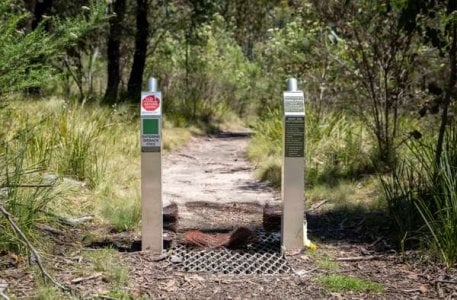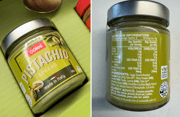Why Everyone Is Talking About This Strange Device at a Famous Aussie National Park Entrance
By
Danielle F.
- Replies 4
Australia's natural landscapes are a treasure trove of biodiversity, but they are under constant threat from invasive species. These unwelcome guests, ranging from feral animals to aggressive weeds, wreak havoc on ecosystems and cost the economy dearly. In an effort to combat this issue, peculiar new devices have been popping up at the entrances of some of the country's beloved national parks, sparking curiosity and conversation among visitors and conservationists alike.
Namadgi National Park, a popular destination located near Canberra in the Australian Capital Territory (ACT), is the latest to adopt this innovative approach. The park has installed a total of seven 'boot cleaners' at various entry points. These devices may seem odd at first glance, but they serve a vital purpose: to prevent the spread of invasive plant species by cleaning visitors' footwear.
The ACT's Parks and Conservation Service has emphasised the importance of these boot cleaners, explaining that they are a simple yet effective tool in stopping the transfer of potentially harmful seeds and weeds that might be hitching a ride on hikers' shoes. The initiative has been met with mixed reactions from the public, with some questioning the allocation of taxpayer funds. However, experts in the field of biosecurity are applauding the move.
Lyall Grieve, a biosecurity and conservation analyst with the Invasive Species Council, has called the installation of boot cleaners a 'great initiative.' Speaking to Yahoo News Australia, Grieve highlighted the critical role these devices play in preventing the spread of destructive organisms like phytophthora, a fungus that poses a significant threat to forests and iconic species such as gum trees.
The financial implications of invasive species in Australia are staggering, with the annual cost to the economy exceeding $25 billion. This figure includes the impact on agriculture, biodiversity loss, and the expense of control measures. Weeds alone are responsible for over $5 billion in control costs and lost agricultural productivity each year. Invasive plants like gamba grass, lantana, and serrated tussock can quickly overtake native vegetation, leading to increased fire hazards and reduced crop yields for farmers.
While Australia has robust biosecurity measures in place to prevent the introduction of new invasive species, many problematic plants were brought into the country intentionally for purposes such as agriculture and landscaping before their negative environmental impacts were fully understood.
The boot cleaners at Namadgi National Park represent a proactive step towards preserving Australia's unique ecosystems. Grieve suggests that such measures should become standard practice in all areas where phytophthora and other invasive species pose a risk. He also points out that foot scrubs are a common biosecurity measure on farms, so it makes sense to extend the same level of care to our precious national parks.
As Australians, we take pride in our weird and wonderful environment, and it's up to us to protect it for future generations. The peculiar boot cleaners may raise eyebrows, but they are a small price to pay for the significant prevention of environmental damage. Next time you visit a national park, take a moment to scrub your boots and join the effort to keep Australia's landscapes free from invasive species.

Have you encountered these boot cleaners on your adventures in Australia's national parks? What are your thoughts on this preventative measure? Share your experiences and opinions with us, and let's continue the conversation about protecting our natural heritage.
Namadgi National Park, a popular destination located near Canberra in the Australian Capital Territory (ACT), is the latest to adopt this innovative approach. The park has installed a total of seven 'boot cleaners' at various entry points. These devices may seem odd at first glance, but they serve a vital purpose: to prevent the spread of invasive plant species by cleaning visitors' footwear.
The ACT's Parks and Conservation Service has emphasised the importance of these boot cleaners, explaining that they are a simple yet effective tool in stopping the transfer of potentially harmful seeds and weeds that might be hitching a ride on hikers' shoes. The initiative has been met with mixed reactions from the public, with some questioning the allocation of taxpayer funds. However, experts in the field of biosecurity are applauding the move.
Lyall Grieve, a biosecurity and conservation analyst with the Invasive Species Council, has called the installation of boot cleaners a 'great initiative.' Speaking to Yahoo News Australia, Grieve highlighted the critical role these devices play in preventing the spread of destructive organisms like phytophthora, a fungus that poses a significant threat to forests and iconic species such as gum trees.
The financial implications of invasive species in Australia are staggering, with the annual cost to the economy exceeding $25 billion. This figure includes the impact on agriculture, biodiversity loss, and the expense of control measures. Weeds alone are responsible for over $5 billion in control costs and lost agricultural productivity each year. Invasive plants like gamba grass, lantana, and serrated tussock can quickly overtake native vegetation, leading to increased fire hazards and reduced crop yields for farmers.
While Australia has robust biosecurity measures in place to prevent the introduction of new invasive species, many problematic plants were brought into the country intentionally for purposes such as agriculture and landscaping before their negative environmental impacts were fully understood.
The boot cleaners at Namadgi National Park represent a proactive step towards preserving Australia's unique ecosystems. Grieve suggests that such measures should become standard practice in all areas where phytophthora and other invasive species pose a risk. He also points out that foot scrubs are a common biosecurity measure on farms, so it makes sense to extend the same level of care to our precious national parks.
As Australians, we take pride in our weird and wonderful environment, and it's up to us to protect it for future generations. The peculiar boot cleaners may raise eyebrows, but they are a small price to pay for the significant prevention of environmental damage. Next time you visit a national park, take a moment to scrub your boots and join the effort to keep Australia's landscapes free from invasive species.
Key Takeaways
- ACT Government installs 'boot cleaners' at Namadgi National Park to prevent the spread of weeds and seeds on visitors' shoes.
- The Invasive Species Council supports the initiative, highlighting its importance in protecting forests from fungi like phytophthora and preventing the spread of invasive plants.
- Invasive species in Australia cause significant environmental and economic damage, costing the economy billions annually in control and lost productivity.
- Biosecurity measures and public initiatives like foot scrubs are essential in combating the threat of invasive species to protect Australia's unique environment and agriculture.








